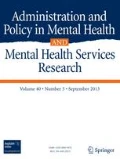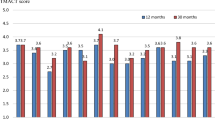Abstract
The compatibility of recovery work with the Assertive Community Treatment (ACT) model has been debated; and little is known about how to best measure the work of recovery. Two ACT teams with high and low recovery orientation were identified by expert consensus and compared on a number of dimensions. Using an interpretive, qualitative approach to analyze interview and observation data, teams differed in the extent to which the environment, team structure, staff attitudes, and processes of working with consumers supported principles of recovery orientation. We present a model of recovery work and discuss implications for research and practice.

Similar content being viewed by others
Notes
We choose the term “consumer” (of mental health services) rather than client, patient, service-user or a number of other possibilities because it is more active than some of the others, and is commonly used in our service context. We recognize, however, the acceptability of terms varies.
A concurrent study was examining success and failure on ACT teams and guided this interview sample selection (Stull et al. in press).
References
Angell, B., Mahoney, C. A., & Martinez, N. I. (2006). Promoting treatment adherence in assertive community treatment. Social Services Review, 80, 485–526.
Anthony, W. A. (2000). A recovery-oriented service system: Setting some system level standards. Psychiatric Rehabilitation Journal, 24(2), 159–169.
Anthony, W. A. (2004). The principle of personhood: The field’s transcendent principle. Psychiatric Rehabilitation Journal, 27(3), 205.
Anthony, W. A., Rogers, E. S., & Farkas, M. (2003). Research on evidence-based practices: Future directions in an era of recovery. Community Mental Health Journal, 39(2), 101–114.
Atkinson, M., Zibin, S., & Chuang, H. (1997). Characterizing quality of life among patients with chronic mental illness: A critical examination of the self-report methodology. American Journal of Psychiatry, 154, 99–105.
Bond, G. R., Drake, R. E., Mueser, K. T., & Latimer, E. (2001). Assertive community treatment for people with severe mental illness: Critical ingredients and impact on patients. Disease Management & Health Outcomes, 9, 141–159.
Bond, G. R., Evans, L., Salyers, M. P., Williams, J., & Kim, H. W. (2000). Measurement of fidelity in psychiatric rehabilitation. Mental Health Services Research, 2(2), 75–87.
Bond, G. R., Salyers, M. P., Rollins, A. L., Rapp, C. A., & Zipple, A. M. (2004). How evidence-based practices contribute to community integration. Community Mental Health Journal, 40(6), 569–588.
Buston, K., Parry-Jones, W., Livingston, M., Bogan, A., & Wood, S. (1998). Qualitative research. The British Journal of Psychiatry, 172, 197–199.
Carlson, L., Eichler, M. S., Huff, S., & Rapp, C. A. (2003). A tale of two cities: Best practices in supported education. Lawrence, KS: The University of Kansas School of Social Welfare.
Charmaz, K. (2006). Constructing grounded theory: A practical guide through qualitative analysis. London: Sage Publications.
Crane-Ross, D., Roth, D., & Lauber, B. G. (2000). Consumers’ and case managers’ perceptions of mental health and community support service needs. Community Mental Health Journal, 36(2), 161–178.
Davidson, L. (2003). Living outside mental illness: Qualitative studies of recovery in schizophrenia. In Qualitative studies in psychology (Vol. xii, 227 pp). New York, NY, US: New York University Press.
Deci, E. L., & Ryan, R. M. (2000). The “what” and “why” of goal pursuits: Human needs and the self-determination of behavior. Psychological Inquiry, 11(4), 227–268.
Deegan, P. E. (1988). Recovery: The lived experience of rehabilitation. Psychosocial Rehabilitation Journal, 11(4), 12–19.
Deegan, P. E. (1996). Recovery as a journey of the heart. Psychiatric Rehabilitation Journal, 19(3), 91–97.
Dennis, D. L., & Monahan, J. (1996). Coercion and aggressive community treatment: A new frontier in mental health law. Plenum Series in Social/Clinical Psychology.
Dincin, J. (1975). Psychiatric rehabilitation. Schizophrenia Bulletin, 13, 131–147.
Downing, S. M. (2004). Reliability: On the reproducibility of assessment data. Medical Education, 38(9), 1006–1012.
Drake, R. E., Rosenberg, S. D., Teague, G. B., Bartels, S. J., & Torrey, W. C. (2003). Fundamental principles of evidence-based medicine applied to mental health care. Psychiatric Clinics of North America, 26(4), 811–820.
Emerson, R. M., Fretz, R. I., & Shaw, L. L. (1995). Writing ethnographic fieldnotes. Chicago: University of Chicago Press.
Frese, F. J., & Davis, W. W. (1997). The consumer-survivor movement, recovery, and consumer professionals. Professional Psychology: Research and Practice, 28, 243–245.
Gomory, T. (2001). A critique of the effectiveness of assertive community treatment. Psychiatric Services, 52, 1394.
Goscha, R., & Huff, S. (2002). Basic Case Management Manual. Lawrence, Kansas: The University of Kansas School of Social Welfare.
Hopper, K. (2007). Rethinking social recovery in schizophrenia: What a capabilities approach might offer. Social Science and Medicine, 65(5), 868–879.
Levstek, D. A., & Bond, G. R. (1993). Housing cost, quality, and satisfaction among formerly homeless persons with serious mental illness in two cities. Innovations and Research, 2(3), 1–8.
Liberman, R. P., & Kopelowicz, A. (2005). Recovery from schizophrenia: A concept in search of research. Psychiatric Services, 56(6), 735–742.
McGrew, J. H., Wilson, R., & Bond, G. R. (2002). An exploratory study of what clients like least about assertive community treatment. Psychiatric Services, 53, 761–763.
Mead, S., & Copeland, M. (2000). What recovery means to us: Consumers’ perspectives. Community Mental Health Journal, 36, 315–328.
Michie, S., Miles, J., & Weinman, J. (2003). Patient-centredness in chronic illness: What is it and does it matter?[see comment]. Patient Education & Counseling, 51(3), 197–206.
Miles, M. B., & Huberman, A. M. (1994). Qualitative data analysis: An expanded sourcebook. Thousand Oaks, CA: Sage.
Neale, M. S., & Rosenheck, R. A. (2000). Therapeutic limit setting in an assertive community treatment program. Psychiatric Services, 51, 499–505.
Noordsy, D., Torrey, W., Mueser, K., Mead, S., O’Keefe, C., & Fox, L. (2002). Recovery from severe mental illness: An intrapersonal and functional outcome definition. International Review of Psychiatry, 14(4), 318–326.
O’Connell, M. J., Tondora, J., Evans, A., Croog, G., & Davidson, L. (2005). From rhetoric to routine: Assessing recovery-oriented practices in a state mental health and addiction system. Psychiatric Rehabilitation Journal, 28, 378–386.
Onken, S. J., Dumont, J. M., Ridgway, P., Dornan, D. H., & Ralph, R. O. (2004). Update on the recovery oriented system indicators (ROSI) measure: Consumer survey and administrative-data profile. In 2004 joint conference on mental health block grant and mental health statistics. Washington, DC.
President’s New Freedom Commission on Mental Health. (2003). Achieving the promise: Transforming mental health care in America. Final Report. DHHS Pub. No. SMA-03-3832. Rockville, MD: Substance Abuse and Mental Health Services Administration.
Rapp, C. A., & Goscha, R. J. (2004). The principles of effective case management of mental health services. Psychiatric Rehabilitation Journal, 27, 319–333.
Rapp, C. A., & Goscha, R. J. (2006). The strengths model: Case management with people with psychiatric disabilities (2nd ed.). New York: Oxford University Press.
Rapp, C. A., & Wintersteen, R. (1989). The strengths model of case management: Results from twelve demonstrations. Psychosocial Rehabilitation Journal, 13, 23–32.
Resnick, S. G., Fontana, A., Lehman, A. F., & Rosenheck, R. A. (2005). An empirical conceptualization of the recovery orientation. Schizophrenia Research, 75(1), 119–128.
Ridgway, P. A. (Ed.). (2000). The recovery papers (Vol. 1). Lawrence, Kansas: The University of Kansas School of Social Welfare.
Ridgway, P., & Press, A. N. (2004). An instrument to assess the recovery and resiliency orientation of community mental health programs: The recovery enhancing environment measure (REE). Paper presented at the Joint National Conference on Mental Health Block Grant and National Conference on Mental Health Statistics, Washington, DC.
Roe, D., & Chopra, M. (2003). Beyond coping with mental illness: Toward personal growth. American Journal of Orthopsychiatry, 73(3), 334–344.
Ryan, R. M., & Deci, E. L. (2000). Self-determination theory and the facilitation of intrinsic motivation, social development, and well-being. American Psychologist, 55(1), 68–78.
Ryff, C. D., & Singer, B. (1998). The contours of positive human health. Psychological Inquiry, 9, 1–28.
Salyers, M. P., McKasson, R. M., Bond, G. R., McGrew, J. H., Rollins, A. L., & Boyle, C. (2007). The role of technical assistance centers in implementing evidence-based practices: Lessons learned. American Journal of Psychiatric Rehabilitation, 10(2), 85–101.
Salyers, M. P., Stull, L. G., Rollins, A. L., McGrew, J. H., Hicks, L. J., Thomas, D., et al. (under review). Measuring the recovery orientation of ACT.
Salyers, M. P., & Tsemberis, S. (2007). ACT and recovery: Integrating evidence-based practice and recovery orientation on assertive community treatment teams. Community Mental Health Journal, 43(6), 619–641.
Stull, L. G., McGrew, J. H., & Salyers, M. P. (in press). Staff and consumer perspectives on defining treatment success and failure in assertive community treatment. Psychiatric Services.
Teague, G. B., Bond, G. R., & Drake, R. E. (1998). Program fidelity in assertive community treatment: Development and use of a measure. American Journal of Orthopsychiatry, 68(2), 216–232.
Ware, N. C., Hopper, K., Tugenberg, T., Dickey, B., & Fisher, D. (2007). Connectedness and citizenship: Redefining social integration. Psychiatric Services, 58(4), 469–474.
Williams, G. C., Grow, V. M., Freedman, Z. R., Ryan, R. M., & Deci, E. L. (1996). Motivational predictors of weight loss and weight-loss maintenance. Journal of Personality and Social Psychology, 70(1), 115–126.
Williams, G. C., McGregor, H. A., Sharp, D., Levesque, C., Kouides, R. W., Ryan, R. M., et al. (2006). Testing a self-determination theory intervention for motivating tobacco cessation: Supporting autonomy and competence in a clinical trial. Health Psychology, 25(1), 91–101.
Williams, G. C., McGregor, H. A., Zeldman, A., Freedman, Z. R., & Deci, E. L. (2004). Testing a self-determination theory process model for promoting glycemic control through diabetes self-management. Health Psychology, 23(1), 58–66.
Williams, G. C., Rodin, G. C., Ryan, R. M., Grolnick, W. S., & Deci, E. L. (1998). Autonomous regulation and long-term medication adherence in adult outpatients. Health Psychology, 17(3), 269–276.
Williamson, T. (2002). Ethics of assertive outreach (assertive community treatment teams). Current Opinion in Psychiatry, 15, 543–547.
Ziguras, S., & Stuart, G. (2000). A meta-analysis of the effectiveness of mental health case management over 20 years. Psychiatric Services, 51, 1410–1421.
Acknowledgements
This study was funded by an IP-RISP grant from the National Institute of Mental Health (R24 MH074670; Recovery Oriented Assertive Community Treatment). We appreciate the involvement of staff and consumers who participated, and the assistance of Angela Donovan, Candice Hudson, Dawn Shimp, and Jenny Lydick in the preparation of this manuscript.
Author information
Authors and Affiliations
Corresponding author
Rights and permissions
About this article
Cite this article
Salyers, M.P., Stull, L.G., Rollins, A.L. et al. The Work of Recovery on Two Assertive Community Treatment Teams. Adm Policy Ment Health 38, 169–180 (2011). https://doi.org/10.1007/s10488-010-0311-2
Published:
Issue Date:
DOI: https://doi.org/10.1007/s10488-010-0311-2



